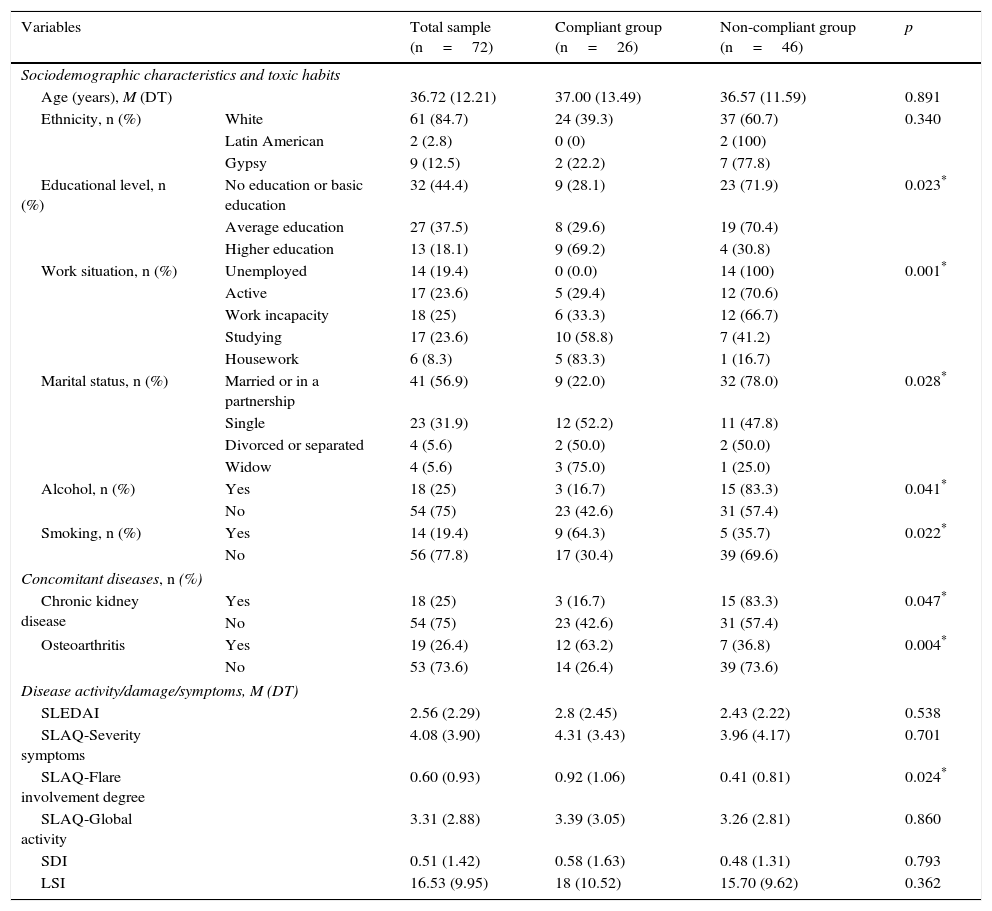Non-adherence to treatment is usually a clinical problem in patients with systemic lupus erythematosus (SLE). Increasing the knowledge of predictors of treatment adherence can be meaningful in the clinical setting. The main objective of the present study was to analyze the influence of sociodemographic, clinical and psychological variables on the degree of treatment adherence in a sample of Spanish women with SLE.
Patients and methodThis is an observational–transversal study. All participants were evaluated for the degree of treatment adherence, their clinical status, psychopathological manifestations, the level of perceived stress and self-efficacy. The sample was divided into two groups (adherent vs non-adherent). The factors associated with a lack of adherence in this sample were analyzed by means of logistic regression.
ResultsThis study comprises 72 women with SLE (average age=36.72±12.2 years). Almost 64% of patients with SLE were non-adherent to treatment. The results showed that a low educational level, being unemployed, living with a partner and alcohol abuse were associated with low treatment adherence. There were significant mean differences between groups in psychopathological subscales of somatization, obsession–compulsion and general psychopathological indices. There were also mean differences between groups for the level of perceived stress. The use of non-steroidal anti-inflammatory drugs, suffering arthrosis and scoring higher in dimensions of psychopathology were significant predictors of treatment adherence, explaining between 35% and 47% of its variability.
ConclusionsIncluding the clinical and psychopathological manifestations as important aspects in the clinical reasoning of health professionals could improve the adherence to treatment of patients with SLE.
El incumplimiento terapéutico constituye un importante problema asistencial en pacientes con lupus eritematoso sistémico (LES). Conocer los factores asociados de este puede ser de gran utilidad en el ámbito clínico. El objetivo de esta investigación fue analizar la influencia de las variables sociodemográficas, clínicas y psicológicas sobre la adherencia al tratamiento en una muestra española de mujeres con LES.
Pacientes y métodoEn este estudio transversal-observacional se evaluó el grado de adherencia al tratamiento, el estado clínico y psicopatológico, el estrés psicológico y la autoeficacia en mujeres con LES. La muestra se dividió en 2 grupos: adherentes y no adherentes. Mediante un análisis de regresión logística se identificaron los factores asociados a la falta de adherencia en esta población.
ResultadosSe evaluaron 72 pacientes (edad media: 36,7±12,2 años). El 63,9% no tuvieron adherencia. Un bajo nivel educativo, estar desempleada, vivir en pareja y el consumo de alcohol se asociaron a una baja adhesión al tratamiento. Se encontraron diferencias entre el grupo adherente y el no adherente en las subescalas psicopatológicas de somatización, obsesión-compulsión e índices psicopatológicos generales, así como en el estrés percibido, obteniendo puntuaciones más altas las pacientes adherentes. El uso de antiinflamatorios no esteroideos (AINE), tener artrosis y mayor alteración psicopatológica fueron predictores significativos de la adherencia al tratamiento, explicando entre el 35 y el 47% de la variabilidad de esta.
ConclusionesLa falta de adherencia al tratamiento de las pacientes con LES fue alta y parece estar influida por factores clínicos y psicopatológicos.











